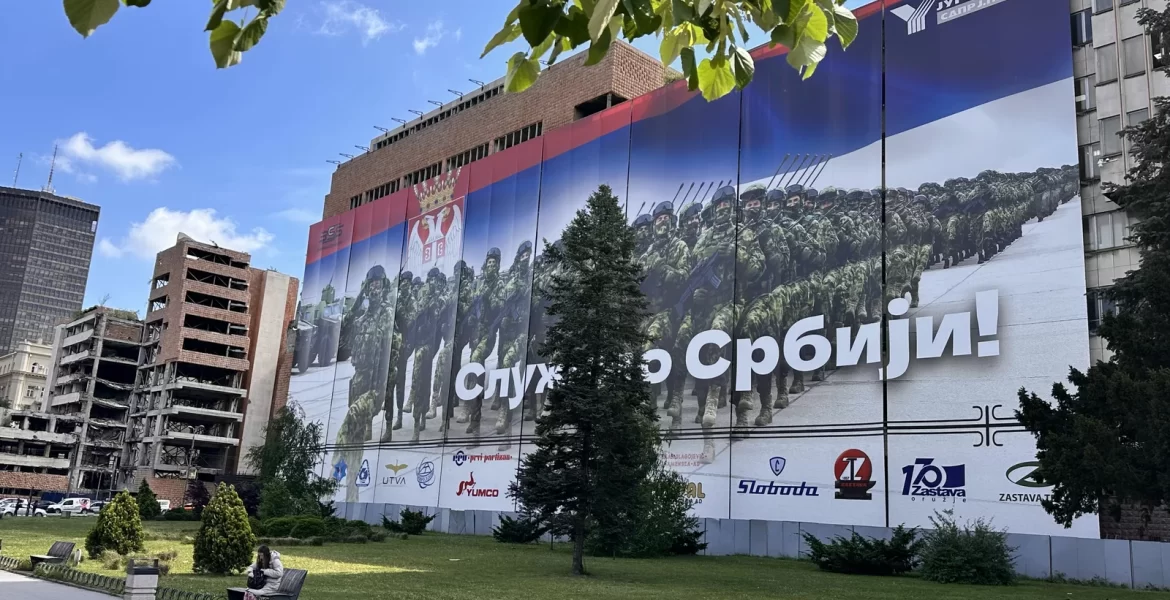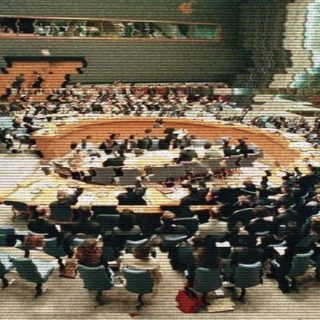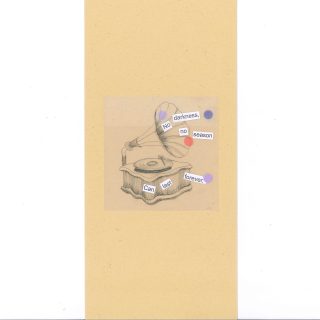Due to its imposing design, function, as well as central location directly across the street from the Government of Serbia, the General Staff building has become a symbol of the 1999 bombing, and everything consciously or subconsciously connected to that event – the undeniable trauma from those times, the self-righteous indignation at the “unprovoked” illegal NATO aggression and violation of Serbia’s territorial integrity, as well as the all-consuming stagnation and inability to recover from the defeat and create a functional society.
It was around the time I was ten that I first noticed the ruins of an old building overgrown with weeds on Nemanjina Street. We were rattling along in public transportation from the distant suburb of Resnik toward downtown, when, on seeing the General Staff building from the window of the bus, I asked my mother what it was, and why there was a half-demolished building left at a spot like that. She told me that the military used to be there and that the building was demolished during the bombing. Though I was little at the time, I remember the bombing quite well, so I didn’t inquire any further, it was all clear. Still, I thought to myself: “Why don’t they fully demolish this old ruin and build some kind of modern skyscraper – like the Beograđanka, but even bigger?”
One cannot help but conclude, therefore, that the ruling Progressives (SNS[1]) know about as much about urban planning as a ten-year-old. Twenty years later, the Minister for Construction, Traffic and Infrastructure, Goran Vesić, announced that an MoU had been signed to implement this visionary project of mine in partnership with Jared Kushner’s real estate company – the latter being Donald Trump’s son-in-law. The opposition-minded section of the public was incensed on hearing this announcement, whereas the other, much more numerous section, cannot fathom why such a fuss is being made about this pile of old concrete and admittedly very pretty pink stone.
After all, this is not the first time (nor will it be the last) that an important work of Yugoslav architectural heritage is being demolished to erect a phallusoid monument to the triumph of the dominant capitalist system. For example, a similar skyscraper complex named Skyline has almost been completed on Kneza Miloša Street, on the site of the old Federal Ministry of Internal Affairs, also heavily damaged during the bombing in 1999, and left that way until 2020. Let me also use an example from my own hood, where the storied IMR[2] factory was demolished to build a shopping mall.
However, these examples scarcely stand a chance at matching the emotional charge of the General Staff building, which, due to its imposing design, function, as well as central location directly across the street from the Government of Serbia, has become a symbol of the 1999 bombing, and everything consciously or subconsciously connected to that event – the undeniable trauma from those times, the self-righteous indignation at the “unprovoked” illegal NATO aggression and violation of Serbia’s territorial integrity, as well as the all-consuming stagnation and inability to recover from the defeat and create a functional society. Lacking is any capacity for self-reflection as to the apartheid regime implemented in Kosovo at the time, which, while it does not excuse the bombing, can be understood as a reason for it.
The Aca of Spades
Perhaps this announcement has also ruffled the feathers of the Other Serbia[3] since it is an incredibly shrewd and efficient political move. Because – why bring up the General Staff building now, when it had been serving as a billboard for the campaign of recruiting cadets into the Army of Serbia, long embodied by a quote from Živojin Mišić “Ko sme, taj može…[4]” (which was recently replaced by a Wagner-group style militarist photo with a call to “serve Serbia”)? The answer is that, in the never-ending election campaign, further amplified in preparation for the allegedly fateful local elections in Belgrade in June, the ends have justified any means for a long time now. Namely, this project can be observed as a public-private partnership for simultaneously achieving several strategic goals of the Progressives’ rule.
First, though it seems in poor taste to give an American company a 100-year concession to the land of the General Staff building in the year of the 25th anniversary of the NATO bombing, the anesthetized voting public is a frog long ago boiled. Let us recall 2015, the beginning of Aleksandar Vučić’s prime ministerial career when Tony Blair visited the Government of Serbia as a courier for his long-since forgotten (but undoubtedly expensive) delivery units – directly across the street from the ruins he is partially responsible for. Let us also recall the time when Vučić, reduced to a timid schoolboy, dutifully sat next to Bill Clinton at a panel on Srebrenica organized by the Clinton Foundation, and when Gerhard Schröder spoke at the SNS rally in the Belgrade Arena on the anniversary of the NATO bombing in 2017 – sapienti sat. The logic is quite simple: win the support of influential Western political figures who have few qualms about receiving public money from hybrid regimes. There is no lack of those on either side of the political spectrum.
In other words, the Generalštab project should serve as a stake for continued cooperation with Trump, which began in his first presidential term, during which the so-called Washington Agreement was signed, with the provisions mostly regulating the Serbia and Kosovo relationship – with Israel. Like a compulsive gambler, Vučić has pawned all of Serbia for the second time already to play the Trump card, though he lost once already, betting that it would allow him to squander another term in office without solving a single fundamental problem faced by this country, so luck be a lady tonight!
On the other side of the transaction, Trump is currently facing an unprecedented number of serious lawsuits, the most serious of which is the one in the state of New York, where his corporation will likely have its license revoked as a consequence of Trump inflating the value of his real estate portfolio. In addition to legal fees, he also has to put up a bond measured in the tens, perhaps even hundreds of millions of dollars. His presidential campaign isn’t exactly cheap either. That is why the entire machinery consisting of oligarchs, media outlets, and the entirety of the global illiberal internationale of right-wing hucksters and kleptocrats – of which Serbia is a sincere member, to provide Trump with much-needed liquidity, and a place to stash his capital away from the long arm of the American justice system.
We are the World
In addition to its sporadic political usefulness, membership in the illiberal internationale provides the Progressives’ regime with a substitute for true internationalism, which, due to its Radical Party DNA[5], it is chronically incapable of. In an attempt to bolster its position in the global brotherhood of ghouls, last year in Budapest (hosted by illiberal big brother Orban), Vučić met Trump’s favorite pundit, Tucker Carlson, renounced even by the infamous Fox News. Thereafter, Carlson has at every occasion used Serbia as an example of a country that upholds conservative (i.e. white supremacist, misogynistic, and homophobic) values, and the message has certainly found its way to Trump and his circle.
Belgrade is the only truly international thing the Progressives have, which is why they would go to any lengths to keep it. Namely, all of the regime’s megaprojects, including Belgrade Waterfront, which has recently spread its tentacles through Belgrade like an octopus, doubling its surface area; the EXPO project, transmuted from a side event for the World Fair into the paradigm for the overall development of Serbia for the next XY years, and even “bringing” Louis Vuitton to Belgrade, are an effort to overcome the trauma of Serbia’s international isolation during the 1990s, to allow the Progressives’ regime to present itself to citizens as a respected member of the international community – the same community it fought against then, and pretends to fight now whenever the political need arises.
The Perpetual Itch of Antifascism
That is precisely why, perhaps paradoxically, the local elections in Belgrade are being nationalized. The Progressives know that they have no solutions to offer the citizens of Belgrade: they don’t know how to reduce air pollution, they don’t want to provide affordable housing for their neighbors, and they haven’t the foggiest idea that expanding roads leads to more traffic, not less. There are countless examples, and they are everywhere around us. On the other hand, back in the 1990s, they already turned banging on about Kosovo, domestic traitors and foreign mercenaries, yellow crooks, oligarch-controlled media, genocide denial, and the valorization of war criminals into an art form. They dictate the rules of the game and play according to their strengths.
That is why murals of convicted war criminal Ratko Mladić, as well as an entire franchise of murals with the caption “Kad se vojska na Kosovo vrati[6]” in Belgrade are under unofficial, but nonetheless real police protection. That is why Hotel Jugoslavija, another jewel of Yugoslav architecture damaged during the bombing in 1999, is planned to be demolished, since it lost its protected status in 2011 due to the damage to its spectacular mid-century interiors and famous crystal chandelier. That is why the caretaker Mayor of Belgrade, Aleksandar Šapić has called for the exhumation of the remains of Josip Broz Tito and their deportation to his birthplace of Kumrovec.
Yugoslavia is an uncomfortable mirror of the Progressives’ failures and inadequacy. All of these examples, including the General Staff building, demonstrate that Yugoslavia must be buried, expunged as though it never existed, because the Yugoslav emancipatory, utopian, multicultural and antifascist heritage constitutes an existential threat, not just to their technology of rule, but their own identity that is a mere veneer hiding the gaping jaws of an insatiable capital that consumes everything in its path, including antifascism.
To conclude, we cannot help but notice that Trump and the Progressives are united in their apparent love for real estate, as one of the few businesses that can be mastered even by the crudest of operators. In fact, the cruder the better! Still, another office-residential complex in Belgrade’s already overly inflated real estate market is unlikely to prove a good investment for either side (least of all for the citizens), but on the other hand, it might lead to Jared taking an active role in solving the Kosovo question, just like he previously solved the Israel-Palestine conflict.
This text was originally published on the website of the Belgrade office of the Heinrich Böll Foundation, and has been slightly updated for republishing with additional context and sources to accommodate foreign readers.
Nemanja Georgijević is a linguist, translator, and political scientist, currently working as Program Assistant at the Heinrich Böll Foundation Office in Belgrade.
The article is republished with permission from the Heinrich Böll Foundation Office in Belgrade and the authors themselves. This is part of a cooperation between Heinrich Böll Foundation Office in Belgrade and forumZFD Western Balkans Program
[1] Srpska napredna stranka – Serbian Progressive Party
[2] Industrija motora Rakovica – Rakovica Motor Industry
[3] See Mimica, A. (2002). Another Serbia : ten years after 1992-2002. Biblioteka Svedočanstva. Helsinki Committee for Human Rights in Serbia. ISBN 978-86-7208-061-2.
[4] “He who dares it can do it!” – a quote by legendary Serbian Field Marshall Živojin Mišić
[5] See: https://www.nin.rs/arhiva/vesti/32699/pripitomljavanje-radikala
[6] „When the army returns to Kosovo“




